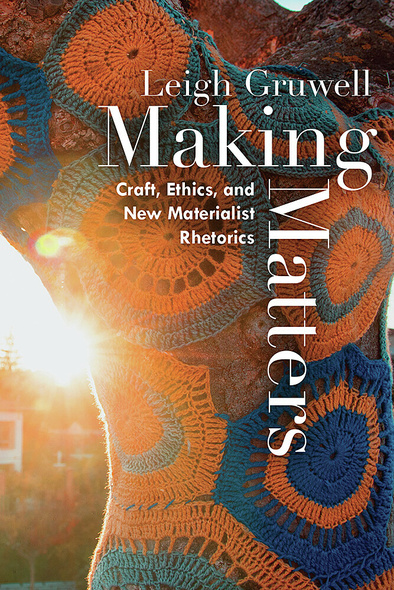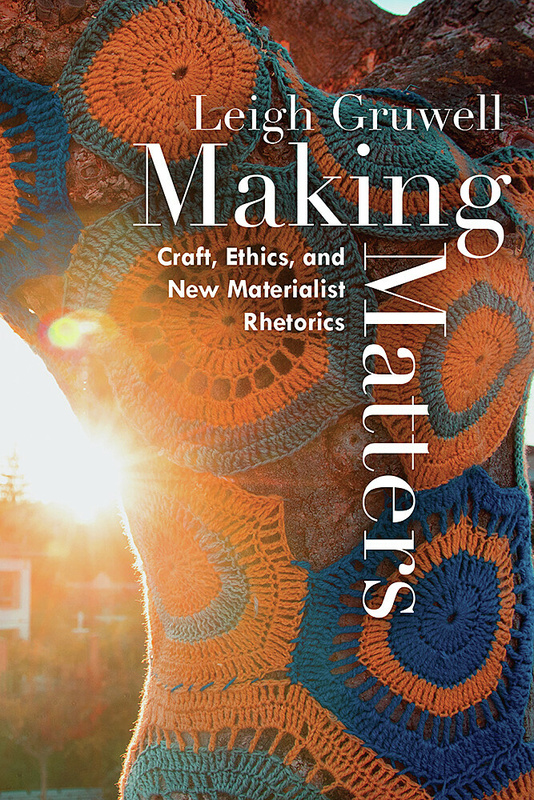Our shopping cart is currently down. To place an order, please contact our distributor, UTP Distribution, directly at utpbooks@utpress.utoronto.ca.
Making Matters
Craft, Ethics, and New Materialist Rhetorics
Utah State University Press
Craft is a process-oriented practice that takes seriously the relationships between bodies—both human and nonhuman—and makes apparent how these relationships are mired in and informed by power structures. Making Matters introduces craft agency, a feminist vision of new materialist rhetorics that enables scholars to identify how power circulates and sometimes stagnates within assemblages of actors and provides tools to rectify that uneven distribution.
To recast new materialist rhetorics as inherently crafty, Leigh Gruwell historicizes and locates the concept of craft both within rhetorical history as well as in the disciplinary history of writing studies. Her investigation centers on three specific case studies: craftivism, the fibercraft website Ravelry, and the 2017 Women’s March. These instances all highlight how a material, ecological understanding of rhetorical agency can enact political change.
Craft agency models how we humans might work with and alongside things—nonhuman, sometimes digital, sometimes material—to create more equitable relationships. Making Matters argues that craft is a useful starting point for addressing criticisms of new materialist rhetorics not only because doing so places rhetorical action as a product of complex relationships between a network of human and nonhuman actors, but also because it does so with an explicitly activist agenda that positions the body itself as a material interface.
To recast new materialist rhetorics as inherently crafty, Leigh Gruwell historicizes and locates the concept of craft both within rhetorical history as well as in the disciplinary history of writing studies. Her investigation centers on three specific case studies: craftivism, the fibercraft website Ravelry, and the 2017 Women’s March. These instances all highlight how a material, ecological understanding of rhetorical agency can enact political change.
Craft agency models how we humans might work with and alongside things—nonhuman, sometimes digital, sometimes material—to create more equitable relationships. Making Matters argues that craft is a useful starting point for addressing criticisms of new materialist rhetorics not only because doing so places rhetorical action as a product of complex relationships between a network of human and nonhuman actors, but also because it does so with an explicitly activist agenda that positions the body itself as a material interface.
‘Making Matters makes craft matter to rhetoric, for ethics, and for furthering our discussions of how to grapple with agency.’
—Casey Boyle, University of Texas
'An exceptionally well researched and articulated argument that makes an excellent contribution to our field.'
—Composition Forum
‘Builds a really useful critique of current work in the field in new materialism—and then provides a comprehensive approach for remedying that work’s shortfalls. It provides useful introductions to connections among sections of the field that need to be brought together: new materialism, feminism, multimodality, and advocacy.’
—Kristin Prins, California State Polytechnic University, Pomona
‘Offers its audience of composition and feminist scholars and graduate students a useful perspective on new materialism and how it can reorient the pedagogical, administrative, and research practices of the field.’
—Marilyn Cooper, professor emerita, Michigan Tech
‘In unearthing the inherent political consequentiality of new materialist rhetorics in alignment with ethics and equity, no one is on a par with Gruwell. Making Matters is an ally and asset for those who want to delve deep into new materialist rhetorics.’
—Constellations
'Gruwell’s case studies contribute to ongoing conversations around what feminist and new materialist rhetorics teach us about struggles for more equitable relations, with an emphasis on local movements and communities that also contributes to how the history and scope of craftivist work is understood.'
—Communication Design Quarterly
Leigh Gruwell is assistant professor of English at Auburn University, where she teaches undergraduate and graduate courses in writing and rhetoric. Her research centers on digital, feminist, and new materialist rhetorics as well as composition pedagogy and research methodologies.





